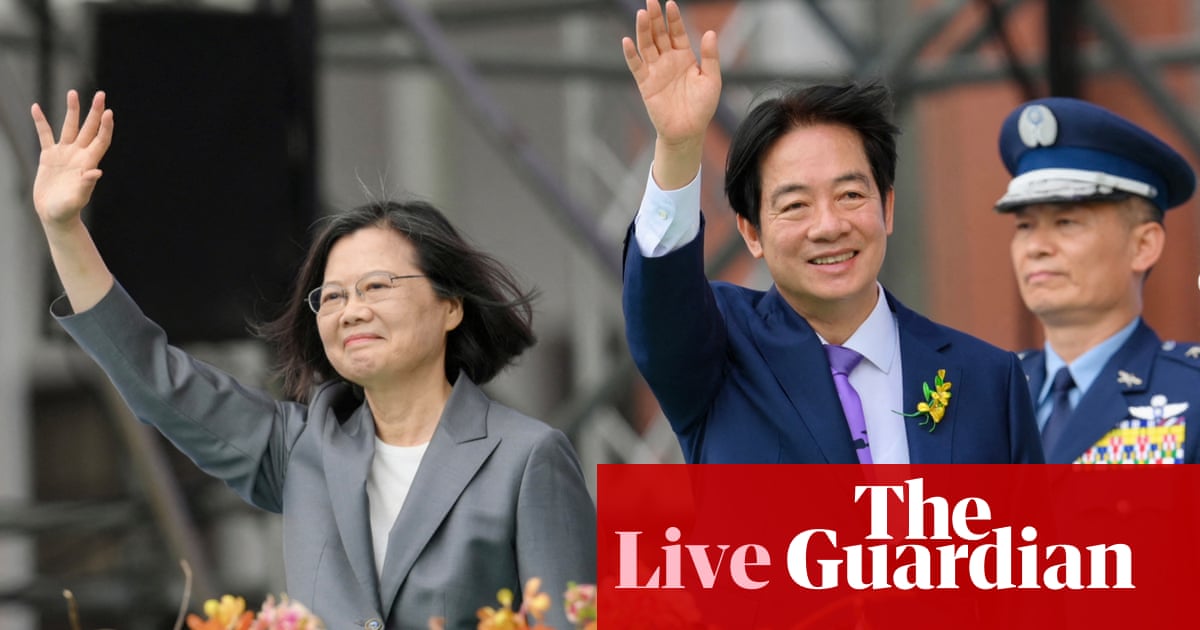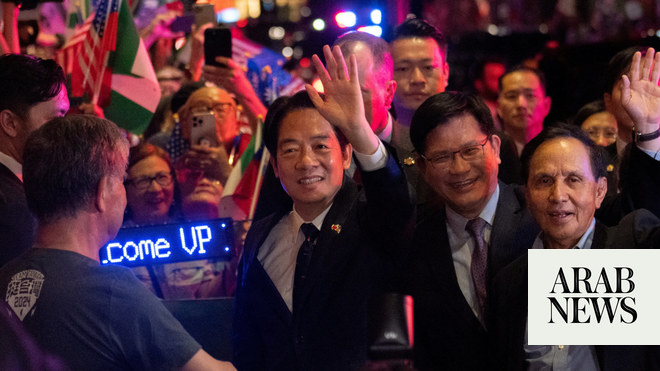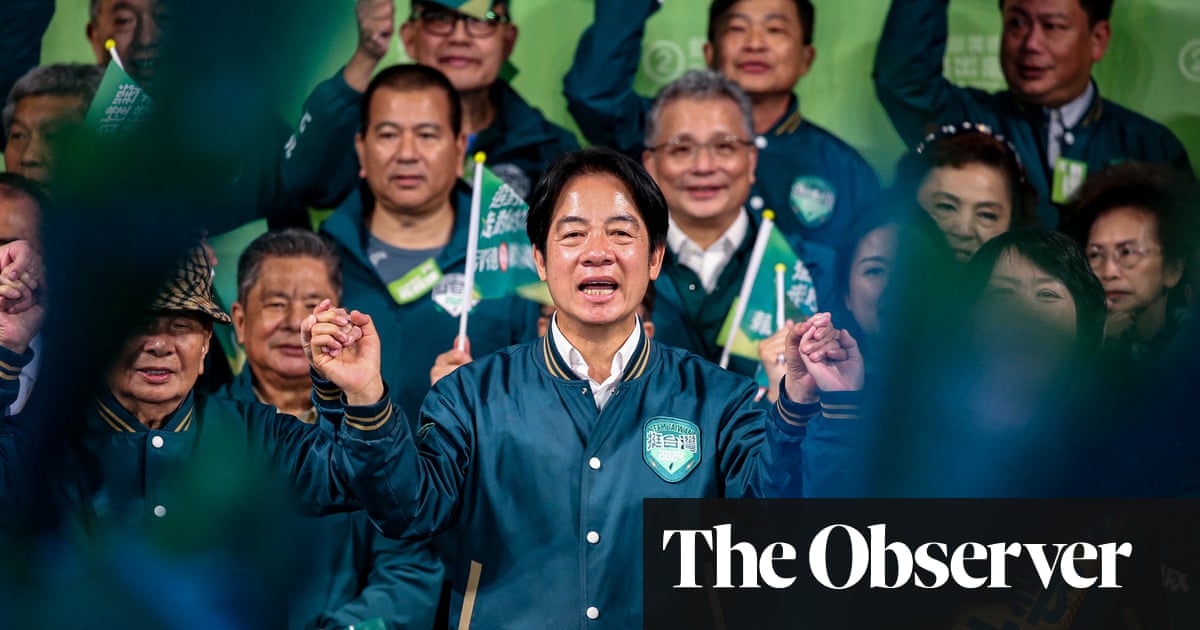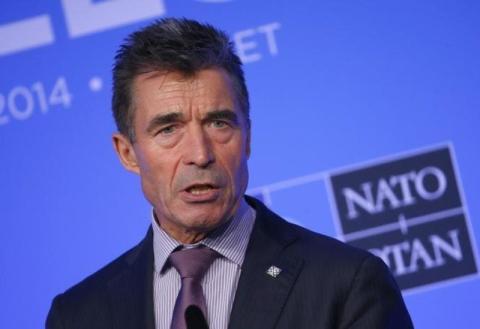
‘China’s threats to annex Taiwan will not simply disappear’, says Lai
“So long as China refuses to renounce the use of force against Taiwan, all of us in Taiwan should accept… China’s threats to annex Taiwan will not simply disappear,” says Lai.
Summary
Here is a summary of today’s inauguration:
Lai Ching-te has been sworn in as Taiwan’s new president, saying the future of Taiwan is as important to the world as it is to Taiwan’s people, as China ramps up military and political pressure on Taipei. Lai is a staunch defender of the island’s democracy and in the past has described himself as a “pragmatic worker for Taiwan independence”.
In his first address as president, Lai mentioned “democracy” 31 times, emphasising the difference between Taiwan and China, where the authoritarian government has vowed to annex the self-ruled archipelago and bring it under Communist rule.
Lai urged China to cease its hostile actions in the Taiwan strait and help Taiwan to maintain peace in the region. “Mutual benefits and prosperous coexistence would be common goals … I hope that China will face the reality of the ROC’s existence,” he said to applause.
“The future we decide is not just the future of our nation, but the future of the world,” he said, referencing not just geopolitical security but also Taiwan’s importance as one of the world’s larger economies and supplier of most of the world’s crucial advanced semiconductors.
“I think it is apparent to us all, we have a nation so long as we have sovereignty,” Lai said. “The Republic of China and the People’s Republic of China are not subordinate to each other,” he said, to cheers from the crowd. “No-one should entertain the idea of giving up political sovereignty in exchange for power,” he says.
China has called Lai, 64, a “dangerous separatist” who will bring “war and decline” to the island. China claims democratic Taiwan as part of its territory.
Meanwhile Chinese social media platform Weibo has blocked a hashtag featuring Lai’s name, a notice on the website showed Monday. “According to relevant laws, regulations, and policies, the content of this topic has not been displayed,” a search for the hashtag LaiChing-te on the X-like Weibo showed around 10.40 am.
US Secretary of State Antony Blinken congratulated Lai, saying he looked forward to Washington and Taipei deepening ties and maintaining “peace and stability across the Taiwan Strait.” He added, “We also congratulate the Taiwan people for once again demonstrating the strength of their robust and resilient democratic system.”
China’s ministry of commerce announced three US weapons manufacturers have been added to its list of “unreliable entities” over their supply of arms to Taiwan. The companies, Boeing Defense Space and Security, General Atomics Aeronautical Systems and General Dynamics Land Systems, are banned from importing or exporting with China, holding investments inside China and senior executives are banned from entering China or applying for entry or resident permits.
The inauguration celebrations were cheerful and bright, featuring dancing tigers, bird puppets, cheerleaders, baseball players, trick bikes, traditional dancing, Hip Hop, breakdancing, heavy metal, a giant blue horse, dragons, an inflatable globe and dancing snacks.
Tsai Ing-wen, 67, stepped down as Taiwan’s president on Monday. On Wednesday, Tsai appeared on television with Nymphia Wind, who recently won the 16th season of the US reality show RuPaul’s Drag Race, and who thanked Tsai for “all these years of making Taiwan the first in so many things”. Tsai took office as the first female president in 2016. Since then, Taiwan has become the first place in Asia to legalise gay marriage. Government statistics suggest that it is doing better than anywhere else in Asia in terms of gender equality. Her first term saw increases in the minimum wage and a boost in funding for childcare.
Ahead of Lai’s inauguration, Beijing’s Taiwan Affairs Office, which handles cross-strait issues, called “Taiwan independence and peace in the strait … like water and fire”. China has called Lai, 64, a “dangerous separatist” who will bring “war and decline” to the island. Beijing has long threatened to use force to bring Taiwan under its control – especially if the island declares independence – with Xi upping the rhetoric of “unification” being “inevitable”.
We will bring you a summary of Lai’s speech soon, as well as analysis.
In the meantime here is a (blurry) photograph of Lai, vice president Hsiao Bi-khim and others dancing on stage with today’s performers:
Lai Ching-te said that peace is the only option and Taiwan will make no concessions on democracy and freedom, calling on China to stop its military and political threats.
China should jointly shoulder the responsibility with Taiwan to ensure peace, so that the world is without the fear of war breaking out, Lai said in his inauguration speech:
In first speech as Taiwan president Lai Ching-te mentions democracy 31 times
Lai Ching-te has been sworn in as Taiwan’s new president, saying the future of Taiwan is as important to the world as it is to Taiwan’s people, as China ramps up military and political pressure on Taipei, the Guardian’s Helen Davidson and Chi Hui Lin report:
In his first address as president, Lai mentioned “democracy” 31 times, emphasising the difference between Taiwan and China, where the authoritarian government has vowed to annex the self-ruled archipelago and bring it under Communist rule.
Lai urged China to cease its hostile actions in the Taiwan strait and help Taiwan to maintain peace in the region.
“Mutual benefits and prosperous coexistence would be common goals … I hope that China will face the reality of the ROC’s existence,” he said to applause.
“The future we decide is not just the future of our nation, but the future of the world,” he said, referencing not just geopolitical security but also Taiwan’s importance as one of the world’s larger economies and supplier of most of the world’s crucial advanced semiconductors.
Lai’s government will concentrate on five key industries, he said: semiconductors; AI; the military; security and surveillance; and next generation communications.
Tonight, Lai will preside over a banquet for more than 1,000 guests.
Foreign Policy has written an in-depth piece on tonight’s menu, which was designed by the Taipei food writer Elizabeth Kao.
Kao has designed a menu with dishes and ingredients representing Taiwan’s five main ethnic subgroups: Indigenous, Hoklo, Hakka, Chinese mainlanders, and Southeast Asians.
When she got the call in January to ask if she could attend, she didn’t expect that she would be asked to design a menu for 1,000 guests, the magazine reports.
“He told me I was going to make the menu. I was shocked,” Kao told Foreign Policy.
Here is what is in store:
As Kao’s team prepared the menu, they narrowed in on ingredients unique to each of these cultures. For the first course, for example, they opted for an array of seasonal vegetables, including Makino bamboo, chayote squash shoots, and lily bulbs, plated over a streak of sauces that represent Taiwan’s ethnic subgroups: te’nas, an Indigenous chili saltwater dip; Dongquan chili sauce, a Hoklo-style hot sauce; a sweet Hakka kumquat jam; fermented tofu paste, brought over by Chinese mainlanders; and satay sauce, a nod to Southeast Asian immigrants.
And there is even a dish said to represent Xi Jinping –bubble tea and shrimp fried rice. Here is a report from the menu tasting:
Then the unexpected happened. As the seventh course arrived, the room suddenly erupted in cheers. “Bubble tea!” Kuo exclaimed. Servers carried in shrimp rice and the iconic Taiwanese beverage, sourced directly from two popular eateries in Tainan. It was essentially takeout on a plate—a jolting deviation from the intricately composed dishes that preceded it. The bubble tea, which came with fat black straws, looked almost cartoonish.
A special request from the president-elect, the course was rumored by the team to be a nod to Chinese President Xi Jinping. In a television interview last summer, Lai said that if he ever had the opportunity to dine with Xi in Taiwan, he’d order shrimp fried rice and a cup of bubble tea.
To recap: Taiwan’s President Lai Ching-te, who has just been sworn in, said on Monday that peace is the only option and Taiwan will make no concessions on democracy and freedom, calling on China to stop its military and political threats.
China should jointly shoulder the responsibility with Taiwan to ensure peace to ensure the world is without the fear of war breaking out, Lai said at his inauguration speech.
“We in Taiwan must all demonstrate confidence and bravely set course for the new world so that the world may embrace Taiwan,” says Lai.
Referring to ‘Mother Taiwan’, he ends by calling on all citizens to “protect her, honour her, let the world embrace her, and allow her the respect she deserves as a great nation”.
"The ROC and the PRC are not subordinate to each other", says Lai
“I think it is apparent to us all, we have a nation so long as we have sovereignty,” he says.
“The Republic of China and the People’s Republic of China are not subordinate to each other,” he says, to cheers from the crowd.
“No-one should entertain the idea of giving up political sovereignty in exchange for power,” he says.
More of Lai’s comments on China below:
I hope that China will face up to the fact of the existence of the Republic of China, respect the choice of the Taiwanese people, show its sincerity, and cooperate with Taiwan’s democratically elected and legitimate government under the principles of reciprocity and dignity, replacing confrontation with dialogue, and exchanges with encirclement, starting with the resumption of bilateral reciprocal sightseeing and tourism, as well as the entry of students to study in Taiwan, so that we can work together in the pursuit of peace and co-prosperity.
His statements are significant, says Guardian Taiwan correspondent Helen Davidson:
This is a significant statement from Lai and something that Beijing and others were looking for. Beijing cut off formal communications with the Taiwan government when Tsai first got took office in 2016. Lai is calling for bilateral cooperations to restart, including reciprocal tourism. It gets a big cheer. Many people in Taiwan have social and business ties with China and would like a return to friendly interactions, even though they do not want unification.
There are still restrictions on Chinese tourists coming to Taiwan (and vice versa), but Lai appears to be saying it has to happen under certain conditions of “dignity and equivalence”. He doesn’t define what that means.
If he’s suggesting that the PRC needs to recognise the sovereignty of the ROC before he will lift the tourism restriction, that’s unlikely to happen.
Lai’s government will concentrate on five key industries, he says: semiconductors; AI; the military; security and surveillance; and next generation communications.
Weibo blocks Lai hashtag
Meanwhile Chinese social media platform Weibo has blocked a hashtag featuring the name of Taiwan’s new President Lai Ching-te, a notice on the website showed Monday.
“According to relevant laws, regulations, and policies, the content of this topic has not been displayed,” a search for the hashtag LaiChing-te on the X-like Weibo showed around 10.40 am.
It wasn’t immediately clear when the hashtag was blocked, and search results for Lai’s name still yielded results.
A hashtag bearing the name of outgoing Taiwan president Tsai Ing-wen was also blocked.
And another, “Taiwan 520 new authorities take office”, was removed.
Weibo often blocks hashtags deemed politically sensitive to prevent them from trending on the platform, used by hundreds of millions in China.
During Taiwan’s presidential election in January, the platform blocked a hashtag on the poll after it became one of the site’s top-trending topics.
But there has been scant mention of Lai’s inauguration in China’s state-run media, with neither state broadcaster CCTV nor ruling party organ People’s Daily featuring coverage on their home pages as of 11 am Monday.
“The future we decide is not just the future of our nation, but the future of the world,” says Lai. He is referring not just to Taiwan’s democracy, but its exports and the global economy.
“Taiwan needs the world, just as the world needs Taiwan,” says Lai. He is now talking about semiconductors, and AI.
Among the small crowd of witnesses at Lai’s swearing-in were Morris Chang, the founder of TSMC, the leading semiconductor manufacturer which is makes most of the world’s highest grade chips and is responsible for a significant portion of Taiwan’s GDP.
‘China’s threats to annex Taiwan will not simply disappear’, says Lai
“So long as China refuses to renounce the use of force against Taiwan, all of us in Taiwan should accept… China’s threats to annex Taiwan will not simply disappear,” says Lai.
Lai calls on China to help maintain peace in Taiwan strait
Lai calls for China to cease its actions in the Taiwan strait and help Taiwan to maintain peace in the strait.
“Mutual benefits and prosperous coexistence would be common goals,” he says. “I hope that China will face the reality of the ROC’s existence,” he says, and pauses for cheers.
"Peace and security on the Taiwan strait are indispensable", says Lai
“There is already a strong international consensus that peace and security on the Taiwan strait are indispensable to global security and prosperity,” says Lai.
“Peace is the only option,” he says, “And prosperity gained through lasting peace is our motivation,” he says.
His government are “pilots for peace”. They will “maintain the status quo”.
Lai wants to allow Taiwan to become the, “MVP of the democratic world”, referring to the slang “Most Valuable Player”.
“War has no winners,” he says.
Lai hails Taiwan"s democracy as its link to the rest of the world
“Democracy, peace and prosperity form Taiwan’s national roadmap, and they are also our link to the rest of the world,” says Lai. “We have grown to become one of th world’s most vibrant democracies,” he says. “Taiwan was the first country in Asia to legalise same sex marriage.”
“Taiwan is already a global beacon, and this honour belongs to all the people of Taiwan.”












